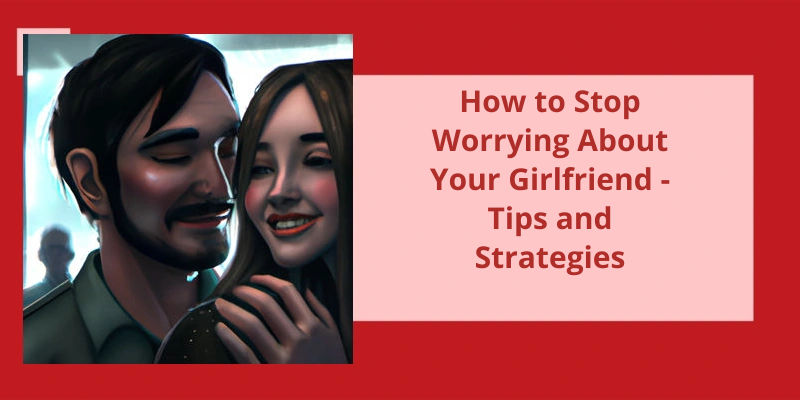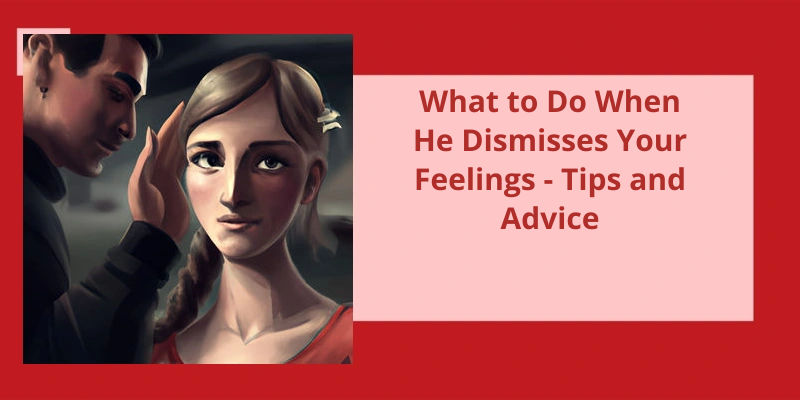Relationships are an integral part of our lives and they play a crucial role in shaping our emotional and mental well-being. However, sometimes even the most loving and fulfilling relationships can lead to worry and anxiety. It’s natural to feel concerned about the health and future of your relationship, but excessive worries can cause unnecessary stress and negatively impact your overall happiness. If you find yourself constantly worrying about your girlfriend, then it might be time to take a step back and assess your relationship. Here are six effective steps that can help you stop worrying and focus on building a healthy and fulfilling relationship. These steps include realizing that excessive anxiety is counterproductive, practicing mindful listening, being willing to be vulnerable, avoiding comparing your relationship to others, accepting that you can’t control your partner's actions, and more. By following these steps, you can develop a more confident and positive outlook on your relationship, and ultimately, improve the quality of your life.
Does Worrying About Someone Mean You Love Them?
Worrying about someone is a common emotion, but it doesn’t necessarily indicate love. Love entails several aspects, including trust, respect, compassion, and empathy, among others. These aspects aren’t directly related to worrying about someone. It’s possible to worry about someone without loving them, just as it’s possible to love someone without worrying about them.
Worrying is often a result of fear, doubt, or uncertainty. It may stem from a lack of control over a situation, or a concern for someones well-being. Worrying can be a natural response to certain situations, but excessive worrying can be detrimental to ones health and relationships. It can lead to chronic stress, anxiety, and depression, among other mental health issues.
Excessive worrying about someone can create a sense of codependency in a relationship. This can result in a lack of personal boundaries and an unhealthy attachment. It can also put undue pressure on the other person to meet unrealistic expectations or fulfill emotional needs. This can strain the relationship and create resentment and conflict.
Love, on the other hand, is a dynamic emotion that involves a mutual exchange and growth between two people. It’s grounded in respect, trust, and understanding. Love enables us to connect with another person and share our lives with them. It requires us to be present, compassionate, and supportive of the other persons growth and well-being.
How to Differentiate Between Worrying and Love in a Relationship
It can be difficult to differentiate between worrying and love in a relationship. However, worrying often stems from a place of fear and anxiety, while love comes from a place of care and support. It’s important to communicate openly with your partner and examine your own feelings and motivations to determine whether your actions are motivated by love or worry.
Dealing with a difficult breakup can be a challenging task, especially when it involves someone we love deeply. Sometimes, no matter how hard we try to move on, we find ourselves constantly thinking about that person. In this article, we will explore twelve effective ways to stop thinking about someone for good. These practical tips will help you find closure, gain perspective, and move forward in a healthy way.
How Do I Stop Worrying About Someone I Love?
Worrying about someone you love can be one of the toughest mental struggles to overcome. It can sap your focus, hinder your productivity, and leave you feeling drained and helpless. The good news is that there are ways to stop thinking about someone for good, and it starts with finding the root of the problem. Understanding why youre fixated on someone will help you gain the insight you need to move on.
One way to find the root of your anxiety is to focus on the facts. People with anxiety disorders often struggle with negative thoughts that spiral out of control. When you start worrying about someone, take a moment to challenge your thoughts. Ask yourself questions like, “What evidence do I’ve to support this thought?” or “Is there any proof that this worry is real?”. By doing this, youll start to break the cycle of anxiety and gain a more realistic perspective on the situation.
Another approach is to accept the feelings youre experiencing. Trying to suppress or ignore your emotions will only make them stronger, so it’s better to acknowledge them and work through them. This might involve talking to someone you trust, practicing meditation or mindfulness, or finding other healthy ways to manage your stress.
Writing down your worries and fears can also be cathartic. Sometimes, it’s difficult to verbalize whats going on inside your head, and putting it down on paper can help you organize your thoughts and gain a sense of control. This can be especially helpful if you find yourself ruminating on the same worries or thoughts over and over again.
Getting distracted is another strategy that can help you break the cycle of worry. Engage in activities that keep your mind and body busy, like exercise, reading, painting, or gardening. By doing something you enjoy, youll be able to focus on the present moment and distract yourself from negative or intrusive thoughts.
Finally, it’s important to meet your own needs and take care of yourself. This might involve getting enough sleep, eating healthily, and engaging in activities that bring you joy and fulfillment. By focusing on your own well-being, youll be better equipped to deal with the challenges that come your way.
Seeking Professional Help or Therapy: Sometimes, Worrying About Someone You Love Can Be a Symptom of a More Significant Issue Like Anxiety, Depression, or Codependency. Seeking Professional Help or Therapy Is One Way to Address and Treat These Underlying Issues.
If you’re concerned about a loved one, it could be a sign that you need professional help like therapy. Constant worrying could indicate underlying problems like anxiety, depression, or codependency which require specialized treatment. Seeking help can be a way to deal with these all-important matters.
It’s not uncommon to experience anxiety when it comes to relationships. In fact, it’s a natural response to the vulnerability that comes with opening yourself up to another person. However, if your anxiety is causing significant distress and interfering with your daily life, it’s important to take action. Here are eight ways to deal with anxiety in a relationship.
How Do I Stop Worrying About Relationship Anxiety?
Dealing with relationship anxiety can be an incredibly daunting and overwhelming experience. At times, it may feel like you’re stuck in a never-ending cycle of worry and fear, unable to shake off the constant sense of unease that’s weighing you down. However, there are ways in which you can effectively manage and overcome relationship anxiety, leading to a more fulfilling and enjoyable love life.
This means being open and transparent with your partner about your fears, worries, and concerns, and working together to find effective solutions. Communication is key here, and it’s important to ensure that you’re both actively listening to each other and working towards a shared understanding.
When anxiety levels rise, it can be tempting to turn to unhealthy coping mechanisms such as excessive drinking or overeating. However, these short-term fixes will do little to alleviate your anxiety in the long run. Instead, focus on self-soothing techniques such as deep breathing exercises, mindfulness meditation, or engaging in physical activity. These methods can help to calm your nervous system and provide a sense of inner peace and tranquility.
Building trust with supportive people is also an important component of managing relationship anxiety. This may involve seeking out therapy or counseling, joining a support group, or confiding in close friends or family members who can offer a listening ear and a supportive shoulder to lean on. By surrounding yourself with people who uplift and encourage you, you can begin to build a sense of resilience and strength that will help you to navigate even the most challenging of relationship situations.
Finally, it’s important to address conflicts or differences of opinion in a healthy and constructive way. This may involve setting clear boundaries and expectations, learning effective communication skills, or seeking out professional mediation if necessary. By working together as a team, you and your partner can overcome any obstacles that may arise and build a stronger, more fulfilling relationship in the process.
Why Can’t I Stop Thinking About the Girl I Love?
There may also be more complex reasons for this constant fixation on the girl you love. Perhaps she represents something deeper to you – a sense of security, stability, or validation that youre not getting elsewhere. It’s important to examine these underlying motivations and work on building a stronger sense of self-worth independent of any one person.
Another common reason for this kind of obsession is a lack of closure or resolution. Maybe youve had a complicated history with this girl, or youve never fully expressed your feelings to her. In cases like these, it can be helpful to seek closure through communication or, in some cases, simply acknowledging your feelings and moving on.
In some instances, this kind of infatuation can be a sign of a larger emotional or mental health issue. Depression, anxiety, and obsessive-compulsive disorder (OCD) can all manifest in obsessive thought patterns and fixation on unrealistic goals or relationships. If you find that your thoughts about this girl are interfering with your daily life or causing you distress, it may be beneficial to seek support from a mental health professional.
Ultimately, it’s important to remember that you can’t control how someone else feels or behaves, and investing all of your emotions and energy into another person is often a recipe for disappointment. While it’s natural to feel strong emotions for someone you care about, it’s crucial to maintain a sense of balance in your life and prioritize your own well-being. This may mean distancing yourself from the situation emotionally, or taking steps to move on and find fulfillment elsewhere.
There are many reasons why you may find yourself unable to stop thinking about a girl you love. By examining your motivations, seeking closure where necessary, and prioritizing your own emotional health, you can begin to move past this fixation and find greater fulfillment in your life. Remember that your emotions are valid, but it’s important to maintain perspective and a sense of balance as you navigate your feelings. With time and support, you can move past this infatuation and find greater happiness in your relationships and yourself.
As the COVID-19 pandemic continues to impact our daily lives, feelings of worry and concern for our loved ones have become increasingly common. While worrying about others is a natural response to challenging times, it’s important to differentiate between healthy and unhealthy worry. In this article, we’ll explore some tips for managing your concern for loved ones in a healthy way, and supporting them through these difficult times.
Is It Okay to Worry About Someone You Love?
When you care deeply about someone, it’s only natural to want the best for them. However, worrying excessively can cause anxiety, stress, and even physical health problems. It’s important to recognize when your worry is healthy and when it’s become unhealthy. Healthy worry is when you show concern for someones well-being and take reasonable steps to help them. Unhealthy worry is when you become consumed with anxiety, dwelling on worst-case scenarios, and unable to enjoy life.
If you’re worried about someone you love, one of the best things you can do is talk to them. Ask how they’re feeling, and let them know you care. Sometimes just talking about their problems can help them feel better. It’s also important to listen carefully without judgment or criticism. Encourage them to seek support from friends, family, or a therapist, and be there for them if they need you.
Another way to show your support is to offer practical help. This could mean helping them with everyday tasks, such as cooking a meal or running errands. It could also mean providing emotional support, such as offering a listening ear or a shoulder to cry on. Remember, however, that it isn’t your responsibility to fix their problems. Instead, focus on being a supportive presence in their life.
It’s also important to take care of your own mental health when worrying about someone you love. Make sure you take breaks, practice self-care, and seek support for yourself if needed. It’s easy to become overwhelmed when worrying about someone else, so it’s important to set boundaries and prioritize your own well-being.
When Does Worrying About Someone You Love Become Unhealthy?
This is a subjective topic and varies from person to person. However, worrying about someone you love can become unhealthy when it begins to negatively impact your own mental and emotional well-being, causing you to experience excessive stress, anxiety or other symptoms. A healthy balance of concern and care for someone you love is important.
Conclusion
In conclusion, worrying excessively about your girlfriend can ultimately have negative consequences on both your mental health and your relationship. By realizing that anxiety doesn’t solve problems and practicing mindful listening and vulnerability, you can start to build a healthier relationship founded on trust and connection. Comparing your relationship to others and trying to control your partner's actions will only lead to frustration and disappointment. By accepting that you can’t control everything and focusing on what you can control, you can free yourself from the burden of worry and focus on building a strong and loving relationship.






